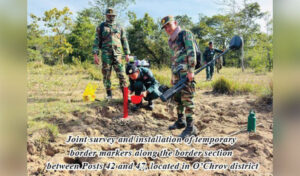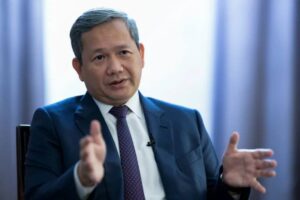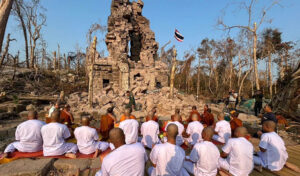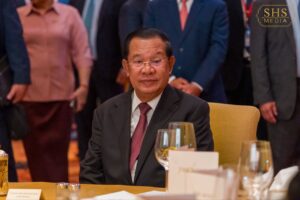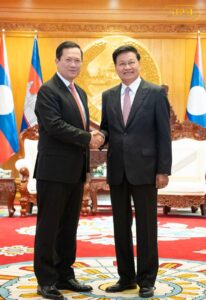Selected Comments Samdech Moha Bovor Thipadei Hun Manet, at the groundbreaking ceremony to build the bridge across the Bassac River (between Chak Angre Krom and Prek Pra)
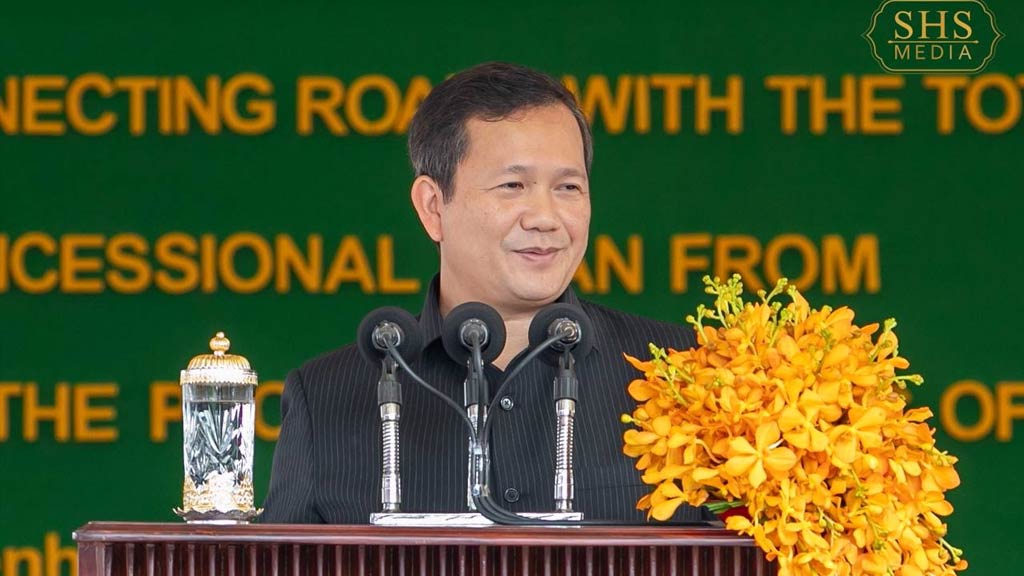 Selected Comments Samdech Moha Bovor Thipadei Hun Manet, at the groundbreaking ceremony to build the bridge across the Bassac River (between Chak Angre Krom and Prek Pra)
Selected Comments Samdech Moha Bovor Thipadei Hun Manet, at the groundbreaking ceremony to build the bridge across the Bassac River (between Chak Angre Krom and Prek Pra)
Selected Comments Samdech Moha Bovor Thipadei Hun Manet, at the groundbreaking ceremony to build the bridge across the Bassac River (between Chak Angre Krom and Prek Pra)
[Unofficial Translations]
[1]
(1) The RGC’s main goal is to end the war, keep the peace and ensure progress
(This area of the) 60-meter width road […] has become an urban area with many roads connecting to it. The main goal of the government in this seventh legislative term, as in the previous term, is to promote sustainable economic growth, and create jobs everywhere […] the main goal is to improve the living standards of the people by reducing poverty. The only goal of the Royal Government for more than 40 years […] is to improve the lives of the people through the creation of the necessary environment, which is ending the war and the maintaining peace and ensuring progress […]
To count just after the end of the war at the end of 1998 through the implementation of the win-win politics, in the last 25 years, we see that the living standards of our people have increased rapidly […] it is worth noted that between 1979-1998 there were still fighting going on and there were still disconnected areas, while much of the national budget was spent on bullets, many full-labor-force people had to join the army to fight on the battlefield, and a lot of land, especially along the border, were inaccessible for mines. After (the war ended in 1998) we have been able to stop those losses, mobilize human resources and budget, and liberate land grow crops […]
(2) Road/bridge infrastructure shorten travel time
Before the arrival of Covid-19, our country grew to the level of one of the fastest growing economies […] with an annual economic growth rate of over 7%. Poverty dropped from more than 50% in 1997 to less than 10% in 2019, and back to 17% dues to Covid-19 […] it is worth understanding that national unification not only unites the people but also the territory […] most of all, through this road connection itself. Infrastructure (roads, bridges) shrinks the time needed (in traveling from A to B) […]
(3) Phnom Penh City Hall and the private sector should study the possibility of building a road from the bridge to National Road No. 1
I just had a moment with (the city Mayor) HE Khuong Sreng and I asked him to figure out the possibility in the future, if it is possible, to build (a road) to connect this bridge to National Road No. 1. This will reduce travel time and congestion. I think that the landowners along the projected road could see that it would be good for them too […] should building this road be possible, traveling would be faster, and the land along it would see a better pricing […] this is left to the private sector to see if it is possible […] I think the population of Phnom Penh will not decrease unless there is a war […] the Royal Government has no plan to limit the number of people to reside in Phnom Penh […]
(4) Maintain peace at all costs at present and in the future
In the last 25 years, the progress we made in improving connectivity and therefore shorten the time needed for traveling is not accidental. It is possible thanks to the leadership of the previous governments led by Samdech Techo, who set a clear political framework, from the Triangle Strategy to the Rectangular Strategy, to maintain peace as the very important basis for accomplishing anything else. During the 500 years of divisions until the end of the war, we had made so unspeakable sacrifices. Therefore, we must now work together to maintain (peace) at all costs, both at present and into the future […]
(5) Roads remain the second of the top five priorities
That they waged wars in the Middle East is already affecting us. The cargo ship from Cambodia to Europe takes 4 to 10 days longer […] so, we pray that no war should take place. Once peace is kept, we put in place the key priorities policies focusing on – people, roads, water, electricity and now technology. However, the road is still a second priority for us both at present and into the future. The word road does not just refer to roads on land. We have land roads, waterways, airways and now the so-called technology roads or digital roads […]
(6) Many firm roads mean more choices and strong methods to achieve hope
Road determines hope. Where there is firm road, there will be stronger and farther hope. Having multiple paths means that we have more choices of hope and more ways to achieve hope. This is the meaning of road construction. For the first six months (to count in three more days) of the establishment of the Royal Government of the 7th legislative term of the National Assembly […] I have participated in inaugurating many achievements in all areas, especially infrastructure […] we shall not withdraw from setting our targets in building road/ bridge infrastructure […] why? It is because roads facilitate traffic, reduce costs and open opportunities for people to work. Roads are like blood vessels to feed the organs wherever it goes […]
(7) Where the road reaches, it grows economy and saves lives
In 2002, I met with Ngozi Okonjo-lweala, then the World Bank Representative in Cambodia and now the Director General of the WTO. At that time, I was still a student and applied to work at the World Bank. She provided me a reference and said that wherever the roads reach, the economy will too. We have built roads to reach the local people, and people will seize the opportunity themselves. There is no need to teach them. We build roads through the rice fields, and people can make their places a production line of some kind and create an agricultural market out of it. Roads and bridges also helped in reducing travel time and saving a lot of lives […]
(8) Roads/ bridges infrastructure, water and electricity lead to local job creation
Initially, we concentrated (infrastructure, such as roads and factories) only in Phnom Penh […] when we built national roads, community roads, and provided water and electricity to the local community/provinces, factories are relocated there […] not only garment, but also agro-industrial factories, agricultural processing plants […] the construction of bridges also helps us lift up the economy, save people’s lives, help improve livelihoods, reduce migration and provide jobs to the grassroots […] on this note, people are still the first priority, and the next priority after the road is the infrastructure that we need to make sure they open the chance for people’s livelihood and improve people’s life […]
(9) In addition to boosting the economy, bridges and roads also reflect local development
Asked if this evolution is over? It’s not over yet. Now, we not only build bridges over water, we also build bridges over land (overpass or flyovers). There are many flyovers in Phnom Penh […] some places are too congested so we needed to build flyovers. In the time to come, we may have to build more bridges along the city belt roads. There may also be a monorail too that would help reducing (congestion). Road/bridges are not only a factor for economic development, but also a factor that reflects the local development […]
(10) Phnom Penh changes no location, prohibits no multiple births and does not prohibit more means of transportation
[…] As the population grows in many places, we need to connect […] Phnom Penh needs to do more. Phnom Penh authorities as well as the government (1) do not have a plan to move Phnom Penh to another place […] now is the time for us to strengthen and expand the city […] second, do not have a plan to prevent people in Phnom Penh from having many children, […] as of present, Phnom Penh people do not want to have many children, […] and thirdly, do not have the plan to prohibit people from buying motorcycles, buying bicycles, buying cars […]
(11) Think about increasing public transportation, building more ring roads and studying subways and light rail
What should we think to solve the traffic problem in Phnom Penh? […] Samdech Techo had ordered several studies and we needed to keep doing that […] firstly, we need to learn about increasing the capacity of public transport – mainly buses […] on the occasion of the upcoming Khmer New Year, the city hall must be ready to provide transport means from Phnom Penh to their districts/provinces as we have been doing every year, […] secondly, we need to consider more ring roads and there may be more sky trains. Soon the ring road will no longer be the ring road since they will be at the center of the city […] and thirdly, we need to think of the means of underground transportation/subway (and) light rail. We are currently studying the rail construction from the new airport into Phnom Penh […]
(12) Population growth, high living standard, more means … find an urban solution
The more people we have, the richer the living standard, and with the more means (of transportation,) moving the city elsewhere is not the choice. The location of this city where the four rivers meet is a strategic location. We may expand the city to the east, the south and the north, but in the middle part, we have to find ways to deal with the urban challenges […] soon we will have the ability, not only to just possess (things/material as other rich countries) but also the ability that the Cambodians can do/build on their own […] infrastructural marvels such as bridges, highways, and subway, whatnot, must involve the Cambodian engineers […] being able to fulfil these by yourself is the ambition of Cambodia […]
[2]
(13) 2024 is to promote friendly relations between the peoples of Cambodia and China
This year is what we define as the year of people-to-people exchanges between China and Cambodia […] in the sixth legislative term, last year, we raised our relations to the strategic level, plus the launch of the diamond cooperation between Samdech Techo and President Xi Jinping […] and in this seventh legislative term, on the basis of sustainability and consistency in our domestic and international policy leadership, we continue to drive this work. This year, we also launched the declaration of the Year of Friendship, presided over by Samdech Pich Sena on behalf of Samdech Techo in Siem Reap, so that we can promote the year of friendship people-to-people relationship between Cambodia and China, increase relations in all fields, which include the promotion of tourism and other sectors […]
(14) From a country torn by war and insecurity to be elected in Travelocity as the friendliest and best in the world
In the 25 years since the war ended, we have tried to build a country from a (catastrophic) war and insecurity to become a stable one. From the time that no one knows of Angkor Wat, of the Cambodian people, and thought of Cambodia as a country of 10 million mines, (Cambodia has) become the place – where tourists in the world voted, according to Travelocity – where the people are the friendliest and the best place in the world. These results are due to the tourists who came and helped spread the word. In some places, tourists came to know Phnom Penh even better than I do […]
(15) The case of two Taiwanese TikTokers filming a kidnapping video for views and selling products
In the past, there have been some misunderstandings, particularly, the people of China have some concerns about security in Cambodia because they saw incomprehensive information provided by some media outlets […] on the 14th (February), we arrested two Taiwanese Tiktoker (in the province of Sihanoukville) […] who acted as being kidnapped In Cambodia. They filmed and sent the footage to their spouses in Taiwan to post and receive hundreds of thousands or even millions of views […] making viewers think that in Cambodia he was kidnapped. Once arrested and asked why did they do that? The TikTokers said they need to capture the views first. Soon more people see the footage, they will sell their products. They came to destroy our country, making hundreds of millions of people watch Tiktok and think that Cambodia is unsafe just because they wanted to sell products […]
Is this the sort of (valentine) love for the Cambodian people? We cannot allow such person to do that. They are now sentenced to two years in prison and subjected to a fine of 4 million. Yesterday, there were attempts to intervene […] interveners say they have sick mothers in Taiwan and have asked to be released. I said if their mother is sick, we should even keep them for a long time. If the mother is sick, they have been so ungrateful. They should be in Taiwan, and should not fly to destroy another country. Secondly, they destroyed the image of Cambodia that tourists may not dare to come to Cambodia and that would afflict income of our people […] I warn others who use Cambodia as a place of business to get views on social media that such an act will be met by strict law enforcement measure. Besides imprisonment and deportation, the person will be blacklisted, and will not allow to enter Cambodia for life […]./.


